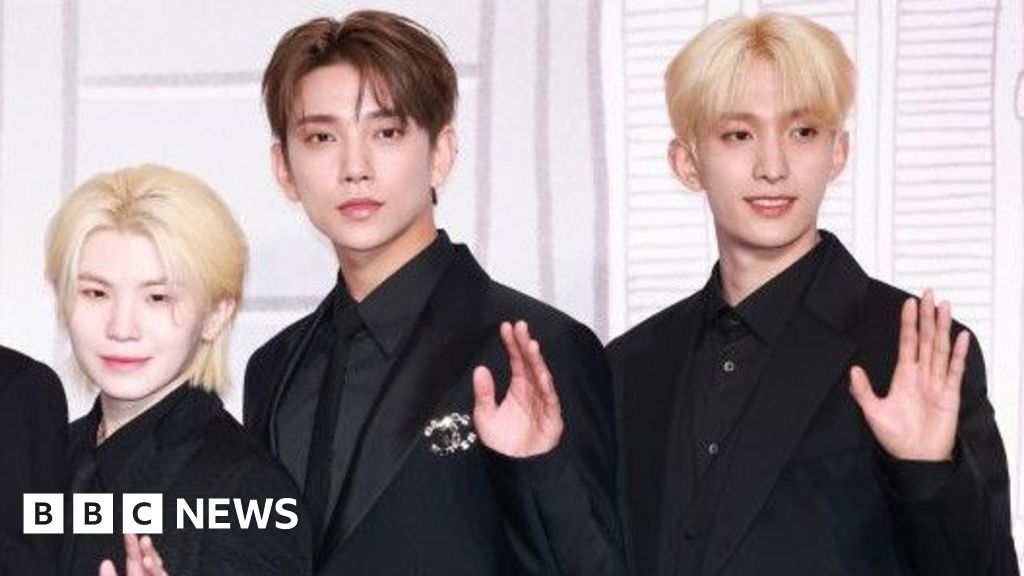There's one issue dividing K-pop fans right now – artificial intelligence.
Many of the genre's biggest stars now use the technology to create music videos and write songs, including boy band Seventeen.
Last year the South Korean group sold nearly 16 million albums, making them one of the most successful K-pop acts in history. But it's his most recent album and single, Maestro, that has people talking.
Music videos feature AI-generated visuals, and records may include AI-generated lyrics. At the album launch in Seoul, one of the band members, Woozi, told reporters He was “experimenting” with AI while writing the song.
“We practiced making songs with AI, because we want to grow with the technology instead of complaining about it,” he said.
“This is a technological development that we have to take advantage of, not just be complacent about. I practiced using AI and tried to explore its pros and cons.”
On the K-pop discussion pages, fans were torn, with some saying that more regulations needed to be implemented before the technology became normal.
Others were more open to it, including superfan Ashley Peralta. “If AI can help an artist overcome creative blocks, that's fine with me,” says the 26-year-old.
The worry though is that an entire album of AI-generated lyrics means fans will lose touch with their favorite musicians.
“I love it when the music reflects an artist and their emotions,” she says. “K-pop artists are highly respected when they work with choreographing, songwriting and composing, because you get a piece of their thoughts and feelings.
“AI can take away the critical component that connects fans to artists.”
Ashley hosts Spill the Sojo, a K-pop fan podcast, with her best friend Chelsea Toledo. Chelsea appreciates Seventeen for being a self-produced group, which means they write and choreograph their own songs, but worries that AI will affect that reputation. .
“If he put out an album full of songs that he didn't personally write, I don't know if it would feel more like Seventeen and the fans want music that's authentically his.”
For those working in K-Pop production, it's no surprise that artists are embracing new technologies.
Chris Nairn is a producer, musician and songwriter working under the name Azodi. Over the past 12 years he has written songs for K-pop artists including Kim Woojin and leading agency SM Entertainment.
Working with K-pop stars means Chris, who lives in Brighton, has spent a lot of time in South Korea, whose music industry he describes as progressive.
“What I've learned from being around Seoul is that Koreans are big on innovation, and that 'what's the next thing?' But are too big, and ask, 'How can we go one step further?' It really hit me when I was there,” he says.
“So, to me, it's no surprise that they're applying AI to songwriting, it's about keeping up with the technology.”
Is AI the future of K-pop? Chris isn't so sure. As someone who experiments with AI song generators, he doesn't feel the lyrics are strong enough for top artists.
“AI is putting out a lot of good quality stuff, but when you're at the top of the songwriting game, usually, the guys who do the best have innovated and created something. AI works with pre-uploaded content and therefore cannot innovate on its own.
If anything, Chris predicts that AI in K-pop will increase the demand for more personalized songs.
“There will be pressure from fans to hear lyrics that are from the artist's heart, and therefore sound different from any songs created using AI”.
Seventeen isn't the only K-pop band experimenting with AI. Girl group Aespa, which has several AI members as well as humans, also used the technology in their latest music video. Supernova features scenes where the band members' faces remain still only during the movement of their mouths.
Podcaster and superfan Chelsea says it “moved” a lot of people.
“K-pop is known for amazing production and editing, so all the scenes made with AI become fascinating,” she adds.
Chelsea is also concerned about artists not getting proper credit. “With AI in videos it's hard to know if someone's original artwork has been stolen, it's a really interesting topic”.
Arpita Udhya is a music journalist and self-proclaimed K-pop superfan. He believes that the use of AI in the industry is proof that artists are being pressured to create new content.
“Most recording artists will put out an album every two years, but K-pop groups are putting out albums every six to eight months, because there's so much hype around them.”
She also believes that with the introduction of AI Core on YouTube, AI has been normalized in the industry. Cover tracks are created by fans and use technology to mimic the sound of another artist.
This is the kind of trend that Arpita would like to see regulated, which western artists are also demanding.
Just last month megastars including Billie Eilish and Nicki Minaj wrote An open letter Calls to stop “predatory” use of AI in music industry
He called on tech firms to commit to not developing AI music generation tools “that undermine or replace the human artistry of songwriters and artists, or compensate us fairly for our work.” Refuse”.
For Arpita, the lack of rules and regulations means that fans feel responsible for what's okay and what's not.
“While there are no clear guidelines about how much AI can and can't be used by artists, we struggle to draw boundaries ourselves, and always have to ask 'what is right and wrong?' “
Thankfully, she feels that K-pop artists are aware of public opinion and hope for change.
“Fans are the biggest part and have a huge influence on artists. Groups are always willing to learn and listen, and if Seventeen and Espa realize they're hurting their fans, they hope so. That will fix it.
